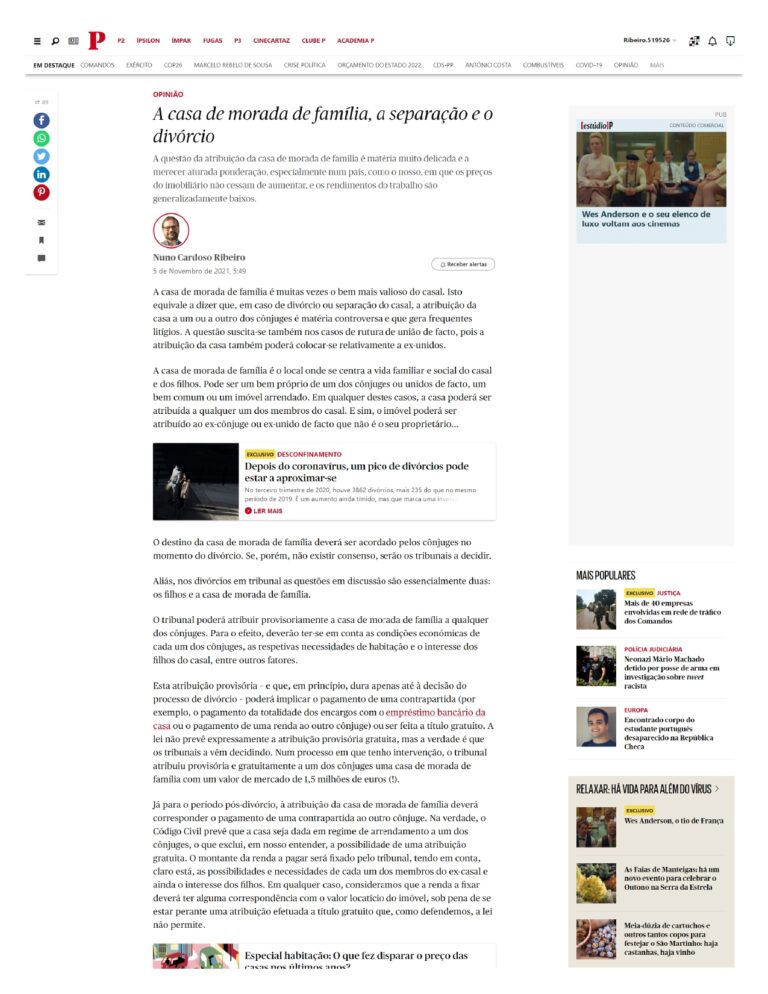Opinion article by our coordinator in the Público newspaper of 5/11/2021 regarding the family home, separation and divorce. Read the article on Público’s website or the translation and pdf below:
“The family home, separation and divorce
The issue of allocating a family home is a very delicate matter and one that deserves careful consideration, especially in a country like ours where real estate prices are constantly rising and income from work is generally low.
The family home is often the couple’s most valuable asset. This means that in the event of divorce or separation, the allocation of the house to one or other of the spouses is a controversial issue that often leads to litigation. The question also arises in cases where the de facto union is broken up, since the allocation of the house may also arise in relation to ex-unions.
The family home is the place where the family and social life of the couple and their children is centred. It can be the property of one of the spouses or unmarried partners, a common property or a rented property. In any of these cases, the house can be assigned to either member of the couple. And yes, the property can be assigned to the ex-spouse or ex-unit de facto who is not its owner…
The destination of the family home should be agreed upon by the spouses at the time of the divorce. If, however, there is no consensus, the courts will decide.
In fact, in divorces in court, there are essentially two issues under discussion: the children and the family home.
The court may award the family home provisionally to either spouse. To this end, the economic conditions of each spouse, their respective housing needs and the interests of the couple’s children, among other factors, must be taken into account.
This provisional allocation – which in principle only lasts until the divorce proceedings are resolved – may involve the payment of a consideration (e.g. payment of the entire cost of the home loan or payment of rent to the other spouse) or be made free of charge. The law does not expressly provide for free provisional assignment, but the courts have been ruling. In one case in which I intervened, the court granted provisionally and free of charge to one of the spouses a family house with a market value of 1.5 million Euros (!).
For the post-divorce period, the allocation of the family home should correspond to the payment of a counterpart or the other spouse. In fact, the Civil Code foresees that the house is given as a lease to one of the spouses, which excludes, in our opinion, the possibility of a free allocation. The amount of rent to be paid will be fixed by the court, taking into account, of course, the possibilities and needs of each member of the ex-spouse and also the interests of the children. In any case, we believe that the rent to be set should have some correspondence with the rental value of the property, otherwise it will be a free allocation that, as we argue, the law does not allow.
Whenever we are dealing with a property that is not common property of the couple but belongs to one of the ex-cohabiting spouses, its allocation to someone who is not its owner must be surrounded, obviously, by the greatest caution. After all, we are talking here about depriving an owner of the use and availability of a property that, more often than not, is his or her most valuable asset. Therefore, only in very limited cases should the allocation of the family home to someone who is not its owner be allowed. In these cases, the duration of this right should be limited in the sentence, establishing, for example, that it will last only until the couple’s child reaches 18 years of age.
The question of the allocation of the family home is, of course, a very delicate matter and deserves careful consideration by our courts, especially in a country such as ours where real estate prices are constantly rising and labor income is generally low. The fact is that for every member of a couple who has their housing needs taken care of with the allocation of property, there is another who may, for this reason, be deprived of acquiring a new property for themselves.”

